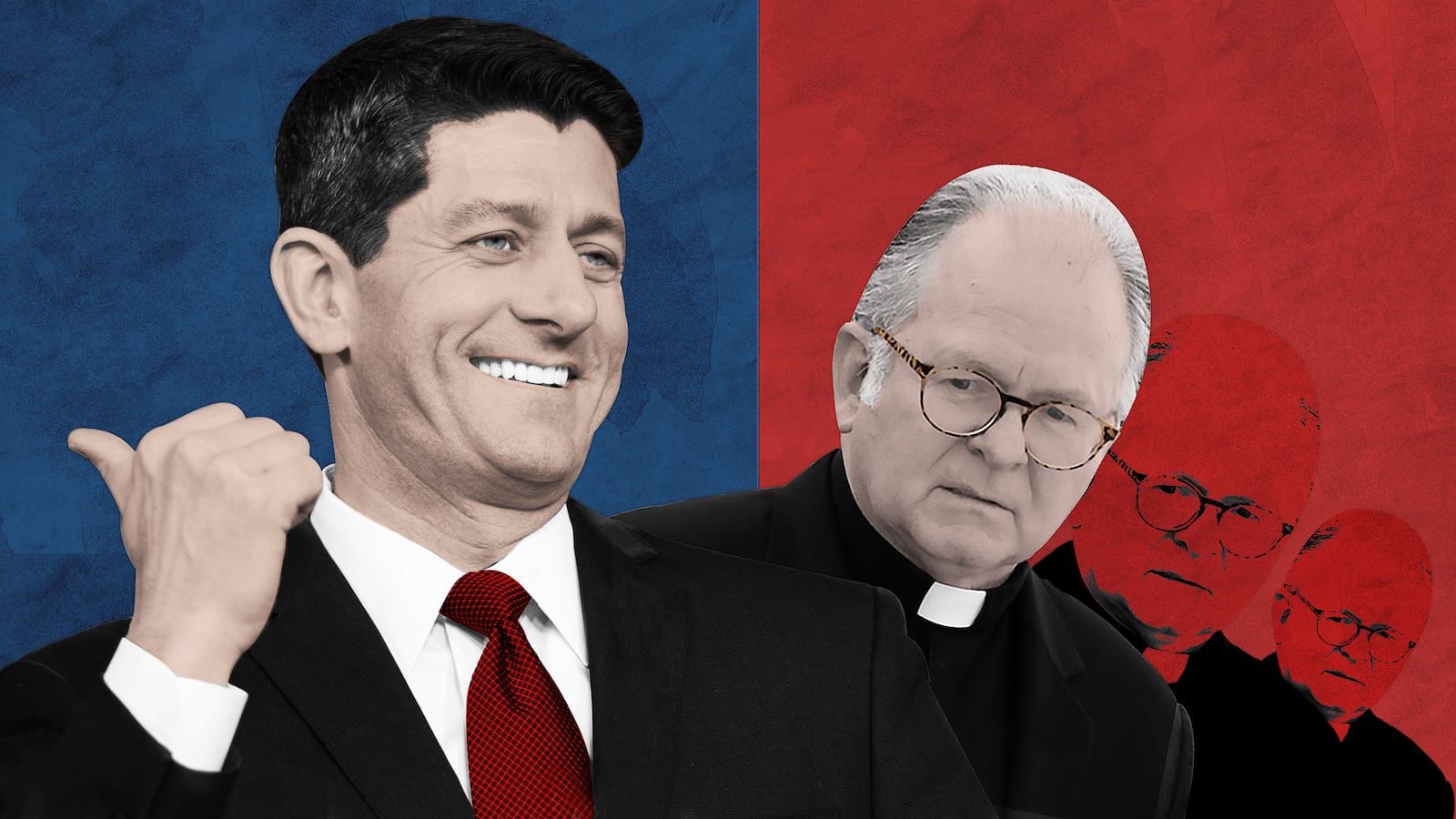Paul Ryan, Speaker of the House for the next eight months, last week took the unprecedented step of demanding the resignationof House Chaplain Patrick Conroy.
Ryan insists that he did so because of Conroy’s “poor performance” – he says he’d received several complaints that the chaplain had not ministered adequately to members of congress. But Democrats and some Republicans think Conroy was fired for having made political remarks, in particular in a November 6 opening prayer, given as the tax plan was being debated, at which he said:
“May all members be mindful that the institutions and structures of our great Nation guarantee the opportunities that have allowed some to achieve great success, while others continue to struggle. May their efforts these days guarantee that there are not winners and losers under new tax laws, but benefits balanced and shared by all Americans.”
Conroy said Ryan then told him, “Padre, you’ve just got to stay out of politics.”
The trouble is, neither story adds up.
On the one hand, there’s no record of Conroy failing to be a good pastor to representatives.
On the other hand, Conroy’s remarks were no more political than prayers other chaplains have offered in the past. For example, Conroy’s predecessor, Rev. Daniel Coughlin, in 2000 used liberal rhetoric when he prayed“we are called upon to speak Your word of justice or defend the weak and the poor.” Eight years later, he prayedin conservative rhetoric, “Help all Americans to see that freedom is not only a treasured gift but a summons to personal responsibility.”
Or guest chaplain Rev. John Appel prayedon February 6, 2006, “Purify our hearts and minds, that we may learn to renounce exploitation and prejudice in all its forms.”
Each of these sentiments can be interpreted as anodyne or as controversial, depending on your point of view. Were they broadsides at elected leaders? Or calls to higher values that people of all parties have in common? You see what you want to see.
After reviewing the archive of Conroy’s opening prayers, it’s clear that the overwhelming majority of them are inoffensive to the point of banality. “Lord, help them to know You. As ultimate truth, send Your spirit upon them, that You might find a dwelling place among them, so that all Your people can place trust in them as leaders as well as their representatives.” (July 24, 2017)
“As Members of the people's House return to Washington, delayed by the storms that have blown through the Southeast, we ask Your blessing upon them that they might be all the more focused in their work.” (September 12, 2017)
Meanwhile, what did Conroy really say in November that was so controversial?
Republicans themselves argued that there would be no winners and losers under their tax plan, that everyone would prosper. Of course, Democrats disagreed with that, but it’s not like Republicans proceeded on the platform of “you know what, let’s let the winners win as much as they want and screw the losers” – even if that was Ayn Rand’s philosophy.
Likewise, Republicans as well as Democrats understand that there is vast inequality in America and that many people are suffering. That was a basic plank of Donald Trump’s campaign platform. They just say that big government makes that suffering worse, while lower taxes and spending lessen it.
In other words, everything Rev. Conroy said, Republicans also said.
No, this has to be something else.
Since Republicans closed ranks around Ryan and quashed a move to obtain records of the matter, we may never know the truth. But if we look closer, this conflict reflects a much larger fight about Catholicism in America, with Conroy representing Pope Francis’s new progressive leadership, and Ryan representing the conservative old guard.
Conroy isn’t just any Catholic, after all: he is a Jesuit, a sect that was once nearly banned by the Catholic Church and which has long been regarded as liberal, ecumenical, and, by some, heretical. Jesuits even feature in several conspiracy theories: they were blamed for the French Revolution and other political events, and were particularly hated in Germany, whom 19thcentury leaders and the Nazis blamed for undermining German values.
Pope Francis becoming the first Jesuit pope was rightly understood as a revolution for the sect and the Church as a whole. And he has fulfilled many of the worst nightmares of conservatives,preaching a liberal economic gospel and even softening somewhat on women’s and LGBT issues, even while maintaining orthodox theological doctrines.
For example, Pope Francis famously said to a reporter about gay people, “who am I to judge?” To which many conservatives would have replied: You’re the pope, it’s your job is to judge.
But it is on economic matters that Pope Francis has most alienated conservatives like Ryan. Ryan is an avowed fan of the (atheist, anti-religious) Ayn Rand, who claimed that people ought to be as free as possible to better themselves, rather than be held back by the weakest. That means as little taxation as possible, as few health and environmental regulations as possible, as little government as possible.
Pope Francis, on the other hand, has preached Jesus’s message of ministering to the “least of these.” He’s washed the feet of the poor, reached out to marginalized populations, and taken an extremely strong line on environmental issues, particularly climate change (which Ryan, in lockstep with the GOP, denies). Those positions lead to the diametrical opposite of everything Ryan stands for. And they represent the longtime liberalism (relatively speaking) of the Jesuits.
That conflict, not a few borderline comments in a prayer, is what this fight is really about. It’s about the soul of American Catholicism, with Ryan and Conroy representing its conservative and liberal wings, respectively. Conroy is part of Pope Francis’s Jesuit-led movement, transforming the Catholic Church to the horror of conservatives. Ryan is one of the conservatives fighting back against it. This fight is a salvo in a much larger war.






